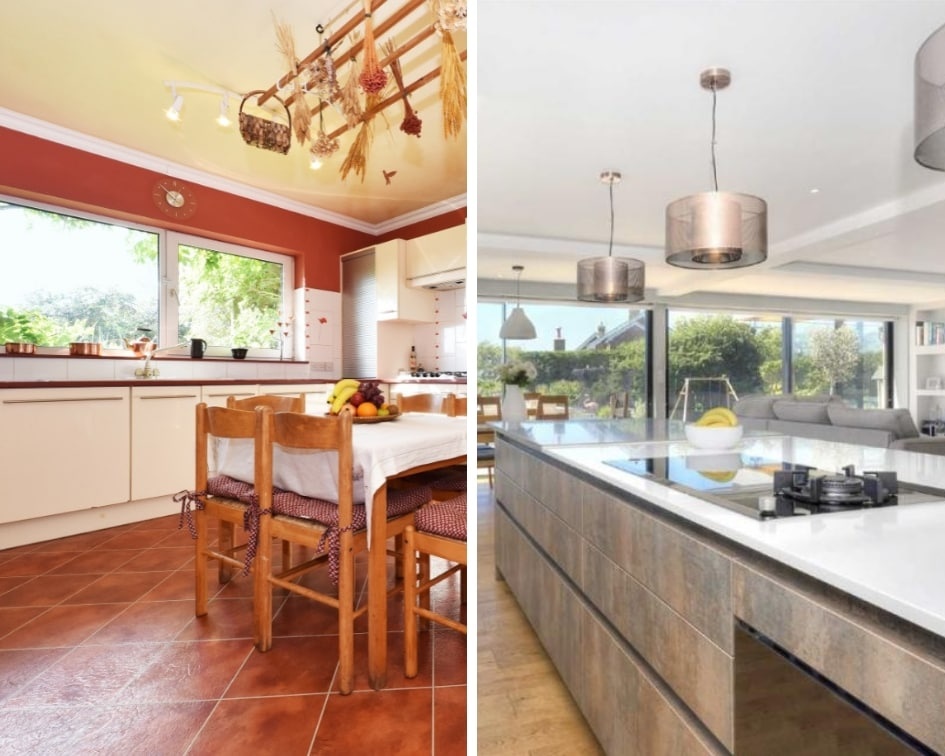New research by Rightmove has found that over 90% of home hunters would consider buying a property that needed renovating.
Rightmove asked two property experts with decades of experience in the housing industry to share their guidebooks for creating the perfect renovation home, and we’ve found some renovation properties all around the UK.
Expert advisors
Martin Tucker has run his own architectural consultancy firm for 25 years and has been working in the industry since he was 16-years-old. He explains how to be pragmatic throughout the process and common pitfalls to avoid.
Rightmove’s property expert Miles Shipside, a qualified Chartered Surveyor and Rightmove’s Commercial Director, reveals how to do your research.
1 Sensible budgeting:
Martin says: “My number one piece of advice would be to look at the total price of how much you think the renovation will cost and work backwards from there. Don’t start adding things up as you go along.
“For an extension or renovation, on average, you’re looking at £1850 per square metre. Then with upgrades, decorating and modifications, it’s £1,000 per square metre.
“But kitchens can cost anywhere between £10,000 and £100,000 so costs are largely dependent on the specification of the job in hand. Basements are becoming a trend, but they’re expensive. They’re about £3,000 per metre squared.
2 Thorough research:
Miles explains: “There are currently thousands of homes on Rightmove that say they are in need of renovation or modernisation. Before starting, it’s often worth consulting local estate agents about what features buyers are looking for in their ideal property to ensure you end up with a saleable and sought-after property and can add more value.”
3 Understanding planning:
Martin says: “A common pitfall is that people expect far more than can realistically be achieved. Say, with a semi-detached property, there is the 45-degree rule with the neighbours to be conscious of. The 45-degree rule is included in most councils’ Residential Design guidelines.
“Basically, an imaginary line is drawn at 45 degrees from the mid-point of your neighbour’s nearest windows across the boundary and no part of your proposed extension should cross this line. However, this rule, dependent on the site, can be flexible and is not applied in all cases. Being aware of existing planning is, again, vitally important. Can it be renewed? Has it been extended before? Has it already been extended to its maximum? Is it in the greenbelt? Is it in a conservation area?”
4 Know what can be done:
Martin says: “It’s important to consider whether the property is listed or in a World Heritage Site. If it’s a Georgian house, for example, it may be a stipulation that certain original features need to stay. Sometimes, conversely, councils will allow ultra-modern extensions on older properties to showcase the contrast between the past and present.”
5 Modifying the interior:
Martin says: “A renovation that delivers a sparkling clean kitchen and bathrooms with a hint of luxury will be a winner. But do not forget the outside, as gardens that are suitable for entertaining family and friends sell a relaxing lifestyle that many aspire to. Patios, suntraps, privacy and BBQ areas all tick the boxes to complete that successful renovation. In my opinion, kitchen/living/dining areas add the most value. But homes must have a modern, plush bathroom. I often think they should be hotel standard – with walk-in showers and all the rest of it.”
6 Don’t cut corners on the building work:
Martin says: “There are certain areas where people can cut corners, and I would say it’s best to cut on decorating and décor rather than building work; don’t compromise there. You don’t get your value for money skimping on quality building. But people are more aware of materials than they used to be. I think a lot of that is down to shows like Grand Designs, with more and more people wanting open plan kitchens and lots of glass.”
7 Making the most of the process:
Martin says: “The main advantage of buying a house to renovate is that you can personalise it. Are you buying a property for yourself or are you a developer looking to make a profit? If you’re in it long term, enjoy it and don’t worry. House prices fluctuate, and it’s something to think about down the line. Finally, strike up a good relationship and mutual respect with the builder. That’s more important than money. And remember that it is a stressful process. Don’t pretend that it won’t be.”
8 Thinking about the end result:
Miles says: “If you’re renovating a property to sell, note that popular properties with many buyers are ones that look well cared for and appealing from the road.
“Once inside, they want to see plenty of natural light and a well-considered internal layout with plenty of storage to put clutter out of sight. A renovation that delivers sparkling clean kitchens and bathrooms with a hint of luxury will be a winner.
“And do not forget the outside, as gardens that are suitable for entertaining family and friends sell a relaxing lifestyle that many aspire to. Patios, suntraps, privacy and BBQ areas all tick the boxes to complete that successful renovation.”
Survey carried out on Rightmove.co.uk in February 2019, with 7014 respondents.
Thinking of buying a new house? Get in touch to get expert advice from our specialist advisors.
Tel: 028 8774 6664
Email: info@mcglonemccabe.com

